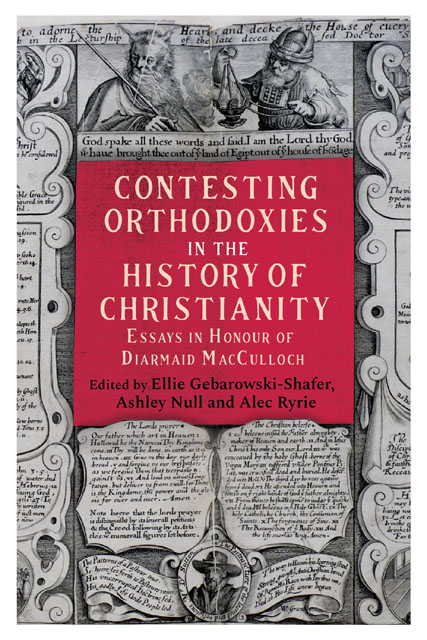Book contents
- Frontmatter
- Contents
- List of Illustrations
- List of Contributors
- List of Abbreviations
- Introduction
- 1 ‘Jewish Christianity’ in Antiquity: Meaningless Category or Heuristic Irritant?
- 2 ‘Sola Fide’: the Wrong Slogan?
- 3 Both Cromwellian and Augustinian: the Influence of Thomas Cromwell on Reform within the Early Modern English Austin Friars
- 4 Lex, Rex and Sex: The Bigamy of Philipp of Hesse and the Lutheran Recourse to Natural Law
- 5 The Authority of Scripture in Reformation Anglicanism: Then and Now
- 6 Orthodoxy and Heresy in the Post-Reformation
- 7 Profanity and Piety in the Church Porch: the Place of Transgression in Early Modern England
- 8 Writing on the Walls: Word and Image in the Post-Reformation English Church
- 9 The Myth of the Church of England
- 10 Mysticism, Orthodoxy and Reformed Identity before the English Revolution: the Case of John Everard
- 11 Sacrilege and the Sacred in England’s Second Reformation, 1640–1660
- 12 ‘I had not the patience to be quiet’: Arthur Bury and The Naked Gospel
- 13 ‘A soul-corrupting indifferentism’: the Intellectual Development of Benjamin Henry Latrobe
- 14 Newman, Dogma and Freedom in the Church
- 15 ‘Tommy, ’ow’s yer soul?’ Reconsidering Religion and the British Soldier
- 16 The King James Vulgate
- 17 The Myth of the Anglican Communion?
- Select bibliography of Diarmaid MacCulloch’s scholarly publications
- Bibliography
- Index
- Tabula Gratulatoria
- Studies in Modern British Religious History
10 - Mysticism, Orthodoxy and Reformed Identity before the English Revolution: the Case of John Everard
Published online by Cambridge University Press: 09 January 2024
- Frontmatter
- Contents
- List of Illustrations
- List of Contributors
- List of Abbreviations
- Introduction
- 1 ‘Jewish Christianity’ in Antiquity: Meaningless Category or Heuristic Irritant?
- 2 ‘Sola Fide’: the Wrong Slogan?
- 3 Both Cromwellian and Augustinian: the Influence of Thomas Cromwell on Reform within the Early Modern English Austin Friars
- 4 Lex, Rex and Sex: The Bigamy of Philipp of Hesse and the Lutheran Recourse to Natural Law
- 5 The Authority of Scripture in Reformation Anglicanism: Then and Now
- 6 Orthodoxy and Heresy in the Post-Reformation
- 7 Profanity and Piety in the Church Porch: the Place of Transgression in Early Modern England
- 8 Writing on the Walls: Word and Image in the Post-Reformation English Church
- 9 The Myth of the Church of England
- 10 Mysticism, Orthodoxy and Reformed Identity before the English Revolution: the Case of John Everard
- 11 Sacrilege and the Sacred in England’s Second Reformation, 1640–1660
- 12 ‘I had not the patience to be quiet’: Arthur Bury and The Naked Gospel
- 13 ‘A soul-corrupting indifferentism’: the Intellectual Development of Benjamin Henry Latrobe
- 14 Newman, Dogma and Freedom in the Church
- 15 ‘Tommy, ’ow’s yer soul?’ Reconsidering Religion and the British Soldier
- 16 The King James Vulgate
- 17 The Myth of the Anglican Communion?
- Select bibliography of Diarmaid MacCulloch’s scholarly publications
- Bibliography
- Index
- Tabula Gratulatoria
- Studies in Modern British Religious History
Summary
Orthodoxy ought in principle to be stable, but is in fact always shifting. This essay exemplifies this truth through a study of John Everard, a politically subversive Puritan preacher whose conversion to spiritualism influenced generations of radical Protestants in England and early America. Everard’s apparent leap from mainstream Puritanism to antinomian spiritualism was not, in fact, marked by any sharp disjuncture, but by piecemeal developments of entirely orthodox themes in Puritan practical divinity which took him almost insensibly into new territory. It was a religious journey which took him to an unexpected destination, namely, cautioning readers and hearers against making an idol of the Scriptures, whose primary meaning he came to believe was allegorical. The essay looks into Everard’s sources, ancient and Reformation era, showing in the complexity of one man’s religious influences that orthodoxy is often less geographically specific than nationalist historiographies have imagined. Everard’s life and thought provides an important example of how deeply England has been integrated into, and dependent on, the religious life of its neighbours, and how much its Christian thinkers have in turn influenced patterns of piety beyond its shores.
The London preacher John Everard, DD (c. 1584–c.1641) appears at a significant juncture in Diarmaid MacCulloch’s study of Silence: a Christian History. He features as a progenitor of a renewed Protestant radicalism with a distinctly mystical flavour in the British kingdoms, which ‘did not emerge fully formed from nowhere in 1640’. For MacCulloch, he represented a gateway for the reintroduction of apophatic mysticism and themes of theosis in an English post-Reformation where such traditions had been largely abandoned. Everard’s renderings of Pseudo-Dionysius, Tauler, Hermes Trismegistus, the Theologia Germanica, and selections from radical reformers, on which he worked in the later part of his life from 1628, appeared in print following his death under the title Gospel-Treasures (or The Gospel-treasury) Opened in four editions between 1653 and 1679. By the final edition, he had a considerable Quaker audience. In a forgotten but influential article of 1877, the Presbyterian historian Robert Ellis Thompson noted that as well as ‘native types of mystical thought and devotion, there were three attempts to transplant foreign types to English soil’ in the seventeenth century: above all, the translations of John Everard and Giles Randall (which, as he put it, aimed to ‘naturalize the Mysticism of the mediaeval “Friends of God” of the Rhine Valley’), and English editions of Jacob Boehme and Hendrik Niclaes.
- Type
- Chapter
- Information
- Contesting Orthodoxies in the History of ChristianityEssays in Honour of Diarmaid MacCulloch, pp. 176 - 192Publisher: Boydell & BrewerPrint publication year: 2021



